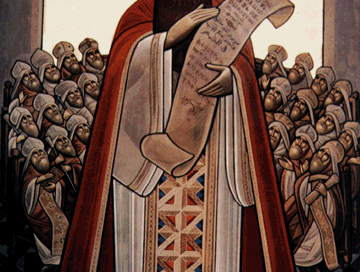Athanasius, Bishop of Alexandria, 373 | For All the Saints

Source: Athanasius, Bishop of Alexandria, 373 | For All the Saints
"Rarely in the history of the Church has the course of its development been more significantly influenced by one person than it was by Athanasius in the fourth century. It is not an exaggeration to say that by his tireless defense of the phrase in the Creed of Nicaea, homousios, “of one being [with the Father]”, he preserved orthodox teaching for the Church in the East during a doctrinally turbulent time in the Church’s history. Two of the late fourth century defenders of the Nicene teaching noted his contribution, Gregory of Nazianzus calling him 'the pillar of the Church,' and Basil the Great saying that Athanasius was 'the God-given physician of her wounds.'"
St. Athanasius was one of the most influential and tireless defenders of Nicene orthodoxy – affirming the Trinitarian nature of God and the full divinity of Christ, as being "homousios" – "of the same substance" – with the Father, as distinct from the followers of Arius, who maintained that He was a created being who was "homoiousios" – "of LIKE substance," not the same, and therefore inferior.
Because the letter "i" in Greek is "iota," this is the origin of the saying (now becoming archaic) that "there is not an iota's worth of difference between them," meaning that there is little-to-no actual difference between two supposedly separate viewpoints. In fact, of course, there was a fundamental difference between these two views!
During much of Athanasius' episcopate, the Arian party was in the ascendant, with the collusion of certain of the Roman emperors, so that he suffered not only opposition but even exile: to the point that "Athanasius contra mundum" – "Athanasius against the world" – became a catch-phrase. However, he was supported by the Church in the West, including the Bishop of Rome, one of the Five Patriarchates of the Ancient Church, and the only one in the West.
Had Athanasius not stood so firm, it is likely that Christianity, if it had even survived, would be a very different faith than it is: those of us who believe that God ultimately directs history would have to say that he was inspired by God to be an instrument of that survival.



